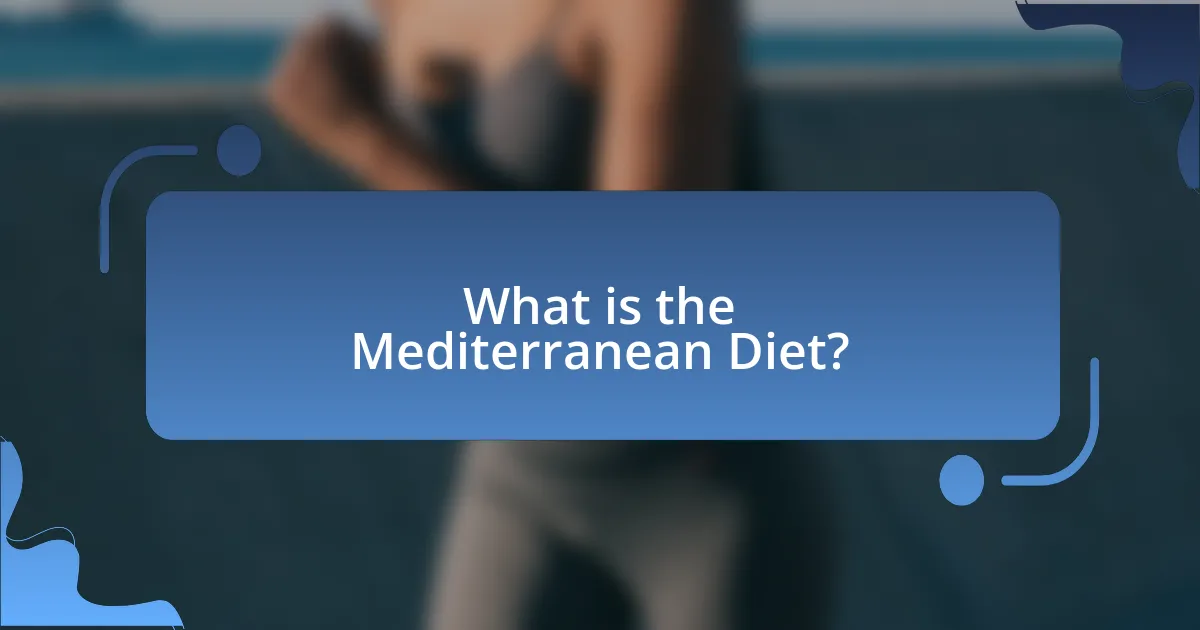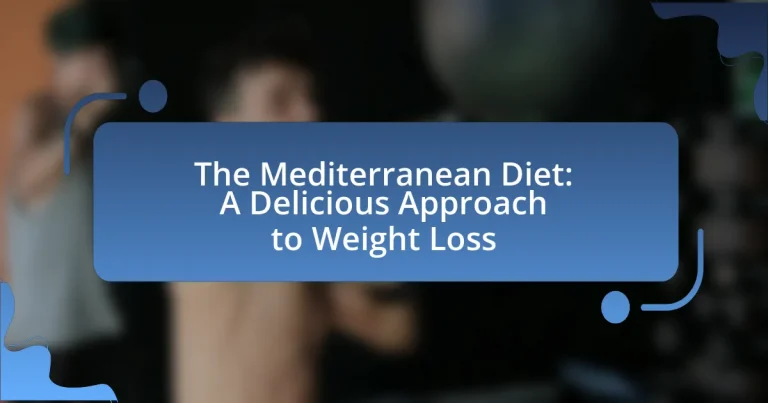The Mediterranean Diet is a dietary pattern inspired by the traditional eating habits of countries bordering the Mediterranean Sea, emphasizing whole foods such as fruits, vegetables, whole grains, legumes, nuts, and healthy fats, particularly olive oil. This diet is associated with numerous health benefits, including reduced risk of heart disease, improved weight management, and enhanced cognitive function. The article explores the origins, cultural influences, and key components of the Mediterranean Diet, as well as its impact on heart health, mental well-being, and long-term weight management. Additionally, practical tips for adopting the diet, overcoming challenges, and maintaining motivation are provided, making it a sustainable and enjoyable approach to healthy eating.

What is the Mediterranean Diet?
The Mediterranean Diet is a dietary pattern inspired by the traditional eating habits of countries bordering the Mediterranean Sea. This diet emphasizes the consumption of whole foods, including fruits, vegetables, whole grains, legumes, nuts, and healthy fats, particularly olive oil, while limiting red meat and processed foods. Research indicates that adherence to the Mediterranean Diet is associated with numerous health benefits, including reduced risk of heart disease and improved weight management, as evidenced by studies published in journals such as the New England Journal of Medicine, which found that participants following this diet experienced significant weight loss and improved metabolic health.
How did the Mediterranean Diet originate?
The Mediterranean Diet originated from the traditional eating patterns of countries bordering the Mediterranean Sea, particularly Greece, Italy, and Spain. This dietary pattern was influenced by the agricultural practices, local foods, and cultural traditions of these regions, emphasizing the consumption of fruits, vegetables, whole grains, legumes, nuts, and olive oil, while limiting red meat and processed foods. Research by Ancel Keys in the 1950s highlighted the health benefits of this diet, particularly its association with lower rates of heart disease among populations in Southern Europe, thus establishing its significance in nutritional science.
What cultural influences shaped the Mediterranean Diet?
The Mediterranean Diet is shaped by various cultural influences, primarily from the countries surrounding the Mediterranean Sea, including Greece, Italy, and Spain. These cultures emphasize the use of fresh, local ingredients, such as fruits, vegetables, whole grains, legumes, and healthy fats like olive oil, which are staples in their traditional cuisines. Historical practices, such as the ancient Greek concept of “philosophy of food,” promote moderation and balance in eating, while the Italian emphasis on communal meals fosters social connections around food. Additionally, the influence of the Arab world introduced spices and cooking techniques that enriched Mediterranean culinary traditions. These cultural elements collectively contribute to the Mediterranean Diet’s focus on health, sustainability, and enjoyment of food.
What are the key regions associated with the Mediterranean Diet?
The key regions associated with the Mediterranean Diet are primarily countries bordering the Mediterranean Sea, including Greece, Italy, Spain, and southern France. These regions are characterized by their traditional dietary patterns, which emphasize the consumption of fruits, vegetables, whole grains, legumes, nuts, olive oil, and fish, while limiting red meat and processed foods. Research has shown that these dietary habits contribute to various health benefits, including reduced risk of heart disease and improved longevity, as evidenced by studies such as the PREDIMED trial conducted in Spain, which highlighted the positive effects of the Mediterranean Diet on cardiovascular health.
What are the main components of the Mediterranean Diet?
The main components of the Mediterranean Diet include fruits, vegetables, whole grains, legumes, nuts, olive oil, fish, and moderate consumption of dairy and wine. This diet emphasizes plant-based foods, healthy fats, and lean protein sources, which contribute to its health benefits. Research indicates that adherence to the Mediterranean Diet is associated with reduced risk of chronic diseases, such as heart disease and diabetes, due to its nutrient-rich profile and anti-inflammatory properties.
What types of foods are emphasized in the Mediterranean Diet?
The Mediterranean Diet emphasizes whole foods such as fruits, vegetables, whole grains, legumes, nuts, seeds, and healthy fats, particularly olive oil. This diet also includes moderate consumption of fish and poultry, while limiting red meat and processed foods. Research indicates that these food choices contribute to improved heart health and weight management, as evidenced by studies showing lower rates of cardiovascular disease among populations adhering to this dietary pattern.
How does the Mediterranean Diet incorporate healthy fats?
The Mediterranean Diet incorporates healthy fats primarily through the use of olive oil, nuts, and fatty fish. Olive oil serves as the primary source of fat, providing monounsaturated fats that are beneficial for heart health. Studies have shown that diets rich in monounsaturated fats can lower the risk of cardiovascular disease. Additionally, the diet includes a variety of nuts, which are high in omega-3 fatty acids and other healthy fats, contributing to improved cholesterol levels. Fatty fish, such as salmon and sardines, are also emphasized for their omega-3 content, which is linked to reduced inflammation and better heart health. These components collectively promote a balanced intake of healthy fats, aligning with the principles of the Mediterranean Diet.
Why is the Mediterranean Diet considered beneficial for weight loss?
The Mediterranean Diet is considered beneficial for weight loss because it emphasizes whole foods, healthy fats, and balanced nutrition, which can lead to reduced calorie intake and improved metabolic health. This diet includes fruits, vegetables, whole grains, legumes, nuts, and olive oil, while limiting processed foods and sugars. Research published in the New England Journal of Medicine found that participants following the Mediterranean Diet experienced significant weight loss and improvements in cardiovascular health compared to those on a low-fat diet. The diet’s focus on nutrient-dense foods helps promote satiety, making it easier to maintain a healthy weight.
What role do portion sizes play in the Mediterranean Diet?
Portion sizes play a crucial role in the Mediterranean Diet by promoting moderation and balance, which are essential for weight management. This diet emphasizes consuming a variety of foods in appropriate amounts, allowing individuals to enjoy nutrient-dense options like fruits, vegetables, whole grains, and healthy fats while controlling calorie intake. Research indicates that smaller portion sizes can lead to reduced overall caloric consumption, which is vital for weight loss and maintenance. A study published in the American Journal of Clinical Nutrition found that participants who adhered to portion control within the Mediterranean framework experienced significant weight loss and improved metabolic health.
How does the Mediterranean Diet promote satiety and reduce cravings?
The Mediterranean Diet promotes satiety and reduces cravings primarily through its emphasis on high-fiber foods, healthy fats, and protein-rich sources. High-fiber foods such as fruits, vegetables, whole grains, and legumes slow digestion and enhance feelings of fullness, which helps control appetite. Healthy fats, particularly from olive oil and nuts, provide a satisfying richness that can curb hunger. Additionally, protein sources like fish and poultry contribute to satiety by taking longer to digest compared to carbohydrates. Research indicates that diets rich in fiber and healthy fats can lead to lower overall calorie intake and reduced cravings, supporting weight management and overall health.

What are the health benefits of the Mediterranean Diet?
The Mediterranean Diet offers numerous health benefits, including reduced risk of heart disease, improved cognitive function, and better weight management. Research indicates that adherence to this diet, which emphasizes fruits, vegetables, whole grains, nuts, and healthy fats, can lower the incidence of cardiovascular diseases by up to 30%. Additionally, studies have shown that the Mediterranean Diet is associated with a 40% reduction in the risk of developing Alzheimer’s disease, highlighting its positive impact on brain health. Furthermore, its balanced approach to nutrition aids in maintaining a healthy weight, as evidenced by a systematic review published in the American Journal of Clinical Nutrition, which found that participants following the Mediterranean Diet experienced significant weight loss compared to those on other diets.
How does the Mediterranean Diet impact heart health?
The Mediterranean Diet significantly improves heart health by reducing the risk of cardiovascular diseases. This diet emphasizes the consumption of healthy fats, such as olive oil, nuts, and fish, which are rich in omega-3 fatty acids that lower triglycerides and improve cholesterol levels. Research published in the New England Journal of Medicine found that individuals following the Mediterranean Diet had a 30% lower risk of heart disease compared to those on a low-fat diet. Additionally, the diet’s high intake of fruits, vegetables, whole grains, and legumes provides essential nutrients and antioxidants that further support cardiovascular health.
What specific nutrients contribute to cardiovascular benefits?
Omega-3 fatty acids, fiber, antioxidants, and potassium are specific nutrients that contribute to cardiovascular benefits. Omega-3 fatty acids, found in fatty fish like salmon and walnuts, have been shown to reduce inflammation and lower triglyceride levels, which are linked to heart disease. Fiber, present in whole grains, fruits, and vegetables, helps lower cholesterol levels and improve heart health. Antioxidants, such as those found in berries and dark chocolate, protect the heart by reducing oxidative stress. Potassium, abundant in bananas and leafy greens, helps regulate blood pressure, further supporting cardiovascular health. These nutrients collectively enhance heart function and reduce the risk of cardiovascular diseases.
How does the Mediterranean Diet lower cholesterol levels?
The Mediterranean Diet lowers cholesterol levels primarily through its emphasis on healthy fats, particularly monounsaturated fats found in olive oil, nuts, and avocados. These fats help reduce low-density lipoprotein (LDL) cholesterol, often referred to as “bad” cholesterol, while increasing high-density lipoprotein (HDL) cholesterol, known as “good” cholesterol. Studies, such as the PREDIMED trial, have shown that participants following the Mediterranean Diet experienced significant reductions in total cholesterol and LDL cholesterol levels compared to those on a low-fat diet. This dietary pattern also includes high fiber intake from fruits, vegetables, and whole grains, which further aids in cholesterol management by promoting better gut health and reducing cholesterol absorption.
What effects does the Mediterranean Diet have on mental health?
The Mediterranean Diet positively impacts mental health by reducing the risk of depression and anxiety. Research indicates that individuals adhering to this diet, which emphasizes fruits, vegetables, whole grains, fish, and healthy fats, experience improved mood and cognitive function. A study published in the journal “Nutritional Neuroscience” found that participants who followed the Mediterranean Diet had a 33% lower risk of developing depression compared to those who did not. Additionally, the diet’s anti-inflammatory properties and high levels of omega-3 fatty acids contribute to better brain health, further supporting mental well-being.
How can the Mediterranean Diet reduce the risk of depression?
The Mediterranean Diet can reduce the risk of depression by promoting a balanced intake of nutrients that support brain health. This diet emphasizes the consumption of fruits, vegetables, whole grains, fish, and healthy fats, particularly olive oil, which are rich in antioxidants, omega-3 fatty acids, and vitamins that have been linked to improved mood and cognitive function. Research published in the journal “Nutritional Neuroscience” indicates that adherence to the Mediterranean Diet is associated with a lower incidence of depression, as it helps reduce inflammation and oxidative stress, both of which are factors implicated in mood disorders.
What is the connection between the Mediterranean Diet and cognitive function?
The Mediterranean Diet is positively associated with cognitive function, as it emphasizes nutrient-rich foods that support brain health. Research indicates that adherence to this diet, which includes high consumption of fruits, vegetables, whole grains, fish, and healthy fats, is linked to a reduced risk of cognitive decline and dementia. A study published in the journal “Neurology” by Scarmeas et al. found that individuals following the Mediterranean Diet had a 28% to 30% lower risk of developing Alzheimer’s disease compared to those who did not adhere to the diet. This connection is attributed to the diet’s anti-inflammatory properties and high levels of antioxidants, which protect brain cells from oxidative stress.
Why is the Mediterranean Diet sustainable for long-term weight management?
The Mediterranean Diet is sustainable for long-term weight management because it emphasizes whole foods, healthy fats, and balanced nutrition, which promote satiety and reduce the likelihood of overeating. This diet includes a variety of fruits, vegetables, whole grains, legumes, nuts, and olive oil, which are nutrient-dense and lower in calories compared to processed foods. Research published in the New England Journal of Medicine indicates that individuals following the Mediterranean Diet experienced significant weight loss and improved metabolic health over a two-year period, demonstrating its effectiveness and sustainability for maintaining a healthy weight.
How does the Mediterranean Diet encourage lifestyle changes?
The Mediterranean Diet encourages lifestyle changes by promoting a balanced intake of whole foods, which fosters healthier eating habits. This diet emphasizes the consumption of fruits, vegetables, whole grains, legumes, nuts, and healthy fats, particularly olive oil, while reducing processed foods and sugars. Research indicates that adherence to the Mediterranean Diet is associated with improved cardiovascular health, weight management, and reduced risk of chronic diseases, as evidenced by a study published in the New England Journal of Medicine, which found that participants following this diet had a 30% lower risk of heart disease compared to those on a low-fat diet. By integrating these dietary principles into daily life, individuals are more likely to adopt sustainable health practices that lead to long-term lifestyle changes.
What makes the Mediterranean Diet enjoyable and easy to follow?
The Mediterranean Diet is enjoyable and easy to follow due to its emphasis on flavorful, fresh ingredients and a variety of food options. This diet includes a wide range of fruits, vegetables, whole grains, legumes, nuts, and healthy fats, particularly olive oil, which enhances taste and satisfaction. Research indicates that the Mediterranean Diet is associated with higher adherence rates because it allows for flexibility and personalization, making it less restrictive compared to other diets. Additionally, the social aspect of sharing meals and the cultural traditions surrounding Mediterranean cuisine contribute to its enjoyment, as studies show that communal eating can enhance the overall dining experience and promote healthier eating habits.

How can one effectively adopt the Mediterranean Diet?
To effectively adopt the Mediterranean Diet, one should focus on consuming a variety of whole foods, including fruits, vegetables, whole grains, legumes, nuts, and healthy fats, particularly olive oil. This diet emphasizes plant-based foods and limits red meat and processed foods, promoting fish and poultry as primary protein sources. Research indicates that adherence to the Mediterranean Diet is associated with numerous health benefits, including reduced risk of heart disease and improved weight management, as evidenced by a study published in the New England Journal of Medicine, which found that participants following this diet experienced significant weight loss and improved cardiovascular health over a five-year period.
What are practical tips for starting the Mediterranean Diet?
To start the Mediterranean Diet, focus on incorporating whole foods such as fruits, vegetables, whole grains, legumes, nuts, and healthy fats like olive oil into your meals. This diet emphasizes plant-based foods, which are rich in nutrients and fiber, promoting overall health and weight loss. Research indicates that following the Mediterranean Diet can lead to significant weight loss and improved metabolic health, as evidenced by a study published in the New England Journal of Medicine, which found that participants lost more weight and had better cardiovascular health markers compared to those on a low-fat diet. Additionally, aim to reduce red meat and processed foods while increasing fish and poultry consumption, aligning with the diet’s principles of sustainability and health.
How can meal planning facilitate adherence to the Mediterranean Diet?
Meal planning can facilitate adherence to the Mediterranean Diet by providing structure and ensuring the availability of diet-compliant foods. By organizing meals in advance, individuals can prioritize the consumption of fruits, vegetables, whole grains, legumes, and healthy fats, which are central to the Mediterranean Diet. Research indicates that structured meal planning can lead to healthier eating patterns and improved dietary adherence, as it reduces impulsive food choices and enhances the likelihood of preparing meals at home. A study published in the Journal of Nutrition Education and Behavior found that individuals who engaged in meal planning were more likely to meet dietary guidelines, including those of the Mediterranean Diet.
What are some easy Mediterranean recipes for beginners?
Some easy Mediterranean recipes for beginners include Greek salad, hummus, and pasta with olive oil and garlic. Greek salad combines fresh vegetables like tomatoes, cucumbers, and olives, dressed with olive oil and lemon juice, making it a refreshing and nutritious dish. Hummus, made from blended chickpeas, tahini, lemon juice, and garlic, serves as a versatile dip or spread, rich in protein and fiber. Pasta with olive oil and garlic is a simple yet flavorful dish that requires minimal ingredients, showcasing the Mediterranean emphasis on healthy fats and fresh flavors. These recipes are not only easy to prepare but also align with the principles of the Mediterranean diet, which promotes whole foods and balanced nutrition.
What common challenges might one face when adopting the Mediterranean Diet?
Common challenges when adopting the Mediterranean Diet include adjusting to new food choices, managing meal preparation time, and overcoming cultural dietary habits. Individuals may find it difficult to incorporate the diet’s emphasis on fruits, vegetables, whole grains, and healthy fats, especially if they are accustomed to processed foods. Meal preparation can be time-consuming due to the need for fresh ingredients and cooking from scratch, which may deter adherence. Additionally, social situations and cultural norms that favor different dietary patterns can create obstacles, making it challenging to maintain the Mediterranean Diet consistently.
How can one overcome barriers to accessing Mediterranean foods?
One can overcome barriers to accessing Mediterranean foods by utilizing local markets, community-supported agriculture, and online grocery services that specialize in Mediterranean products. Local markets often provide fresh produce, grains, and legumes at competitive prices, making it easier to incorporate these foods into one’s diet. Community-supported agriculture programs allow individuals to purchase shares of local farms, ensuring access to seasonal Mediterranean ingredients. Additionally, online grocery services can deliver Mediterranean staples directly to consumers, expanding access regardless of geographic location. Studies indicate that increased availability of Mediterranean foods correlates with higher adherence to the Mediterranean diet, which is linked to numerous health benefits, including weight loss and improved cardiovascular health.
What strategies can help maintain motivation while following the Mediterranean Diet?
To maintain motivation while following the Mediterranean Diet, individuals can set specific, achievable goals and track their progress. Research indicates that goal-setting enhances motivation by providing clear targets and a sense of accomplishment. Additionally, incorporating variety in meal planning can prevent monotony and keep the diet enjoyable, as studies show that diverse food options increase adherence to dietary plans. Engaging in social support, such as joining a community or sharing experiences with friends, can also bolster motivation, as social interactions have been linked to improved dietary compliance.
What are the best practices for long-term success with the Mediterranean Diet?
The best practices for long-term success with the Mediterranean Diet include consistently incorporating a variety of whole foods, prioritizing plant-based ingredients, and maintaining a balanced intake of healthy fats. Adopting a diet rich in fruits, vegetables, whole grains, legumes, nuts, and olive oil supports overall health and weight management. Research indicates that individuals following the Mediterranean Diet experience lower rates of chronic diseases, such as heart disease and diabetes, due to its emphasis on nutrient-dense foods and healthy fats. Additionally, practicing mindful eating and portion control can enhance the sustainability of this dietary approach, as evidenced by studies showing that mindful eating contributes to better weight management and satisfaction with meals.
How can one integrate the Mediterranean Diet into a busy lifestyle?
To integrate the Mediterranean Diet into a busy lifestyle, one can prioritize meal planning and preparation. By dedicating a few hours each week to prepare meals in advance, individuals can ensure they have healthy options readily available, reducing the temptation to opt for fast food. Research indicates that meal prepping can lead to healthier eating habits and better adherence to dietary guidelines. For instance, a study published in the Journal of Nutrition Education and Behavior found that individuals who engaged in meal preparation were more likely to consume fruits, vegetables, and whole grains, which are staples of the Mediterranean Diet. Additionally, incorporating quick recipes that utilize pantry staples like canned beans, whole grains, and frozen vegetables can streamline cooking during hectic days.
What resources are available for ongoing support and education on the Mediterranean Diet?
Resources available for ongoing support and education on the Mediterranean Diet include reputable websites, cookbooks, online courses, and community programs. Websites such as the Oldways Mediterranean Diet Resource Center provide guidelines, recipes, and educational materials. Cookbooks like “The Complete Mediterranean Cookbook” by America’s Test Kitchen offer practical recipes and meal plans. Online platforms such as Coursera and Udemy feature courses on Mediterranean cooking and nutrition. Additionally, local community centers and health organizations often host workshops and support groups focused on the Mediterranean Diet, promoting a sustainable lifestyle change.


